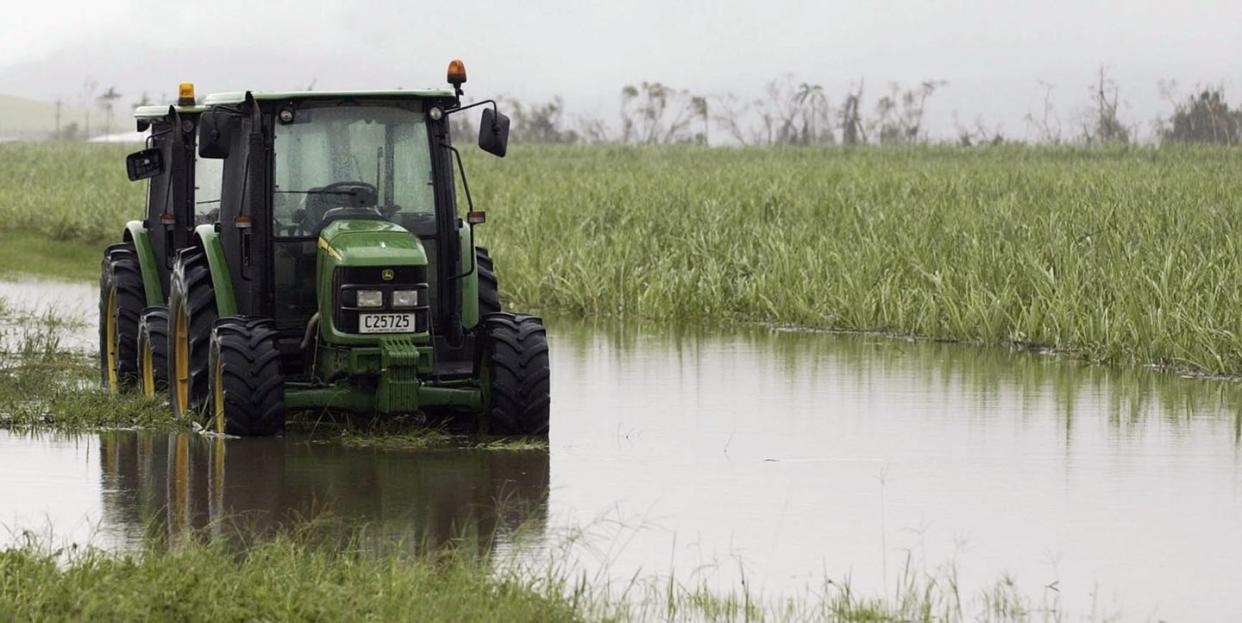The Question Isn't Whether We're Approaching an Agricultural Disaster. It's How Often They'll Soon Happen.

First, tariffs. Then, massive flooding, including the phenomenon of inland icebergs. Then, continued flooding. And now, tornadoes. And it's still planting season. The country's farmers are not having a good spring. From the Kansas State University News Service:
Kansas State University cropping systems specialist Ignacio Ciampitti says this spring’s conditions have been particularly vexing for the state’s corn and soybean growers, and it may cause many of them to re-think their management strategies. “One of the main issues we are facing today is simply planting the crop,” Ciampitti said. “For those that planted in mid- to late-April, they may be facing a problem due to the temperatures not being as high as expected for this time of year. And in some areas, there was quite a bit of rain, so the crop is having to respond to two factors – temperature and water.” In areas where there was excess rain, some corn fields had standing water, Ciampitti said, causing that crop to grow slowly. “What we will start seeing after the water recedes, in some situations, is that those plants will start dying,” he said.
“The number one priority (as of mid-May) is to make sure that you plant your fields,” Ciampitti said. “As soon as you have any time, and it may be between rains, make sure you go back to those fields that you planted early and do some scouting. That will help you to assess the level of damage and put some strategy regarding what fields you should need to go about right away.” Farmers who are thinking about re-planting should also be cognizant of the late May deadlines for planting as they relate to crop insurance. “If you plant after the deadline, you will not be able to insure the entire crop,” he said.
Of course, the Chinese Climate Hoax isn't helping matters, either. Violent weather of one sort or another is increasing as the crisis intensifies, and the violent weather can come in many forms, as we learned over the weekend. (Senator Professor Warren, out campaigning near to where the storms struck in Iowa, had to campaign through the storm sirens. Of course, she grew up in Oklahoma, so her instincts for these things are finely honed.) We are edging closer and closer to an agricultural disaster this year. From Wired:
Soggy weather and uncertainty over President Trump’s trade war have combined this year to keep farmers out of their fields. According to the US Department of Agriculture’s latest crop progress report, farmers have planted just 49 percent of their intended corn acres for 2019, nearly half the amount they usually average at this time of year. Soybean plantings are down to just 19 percent of acres, compared with the 47 percent average. In Illinois, which is the second-biggest producer of both corn and soy, the soil is so saturated that moisture levels are approaching the 99th percentile statewide. Farmer there have planted just 24 percent of corn acres, and 11 percent of soy. Super-soaked spring soils, unplanted fields, record-rising rivers, runaway barges-this is in all likelihood what climate change looks like for the middle of the country.
The question is not just whether we're approaching an agricultural disaster, but also whether or not the agricultural disaster is going to be an annual thing. America's agricultural sector is in desperate trouble and the president* is winging it-tossing cash at embattled soybean farmers in the hopes that they won't notice that his trade policies are coming down on them like the hail that's actually coming down on them every couple of days. One of the more important sources for information on this facet of our general national crisis can be found here on the electric Twitter machine, as is this place.
You don't have to be Luther Burbank to understand that farming becomes very hard if your brand-new heavy-duty piece of farm machinery gets picked up and tossed across the fields like a child's balloon. There are lives and families being tossed around as well. And, although pure politics is pretty trivial by comparison, the Democratic Party never will have a better chance to make inroads into these constituencies than this time around, as various smart people in those states have been hollering about for quite some time now.
Misery loves company, but it needs attention more.
Respond to this post on the Esquire Politics Facebook page here.
('You Might Also Like',)

